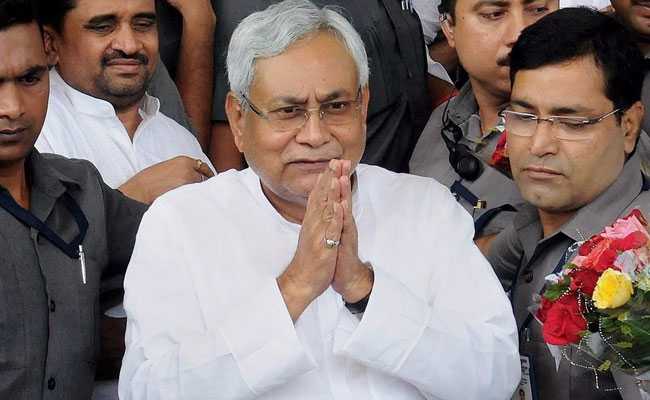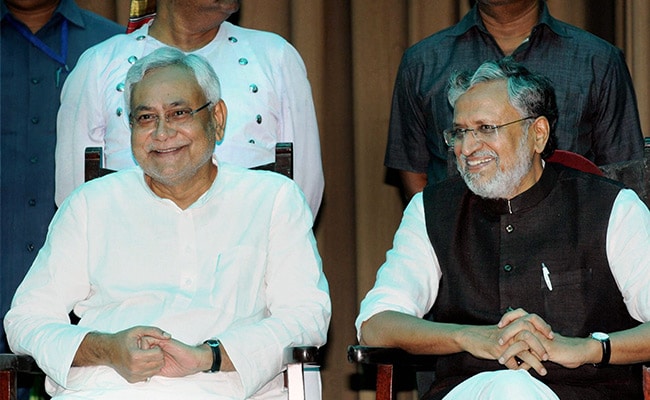Nitish Kumar shortened his speech in the assembly on the day of his trust vote reportedly to accommodate the Friday namaaz. This is like Amit Shah sharing a meal with Dalits while those inspired by Sangh ideology smash the statue of Ambedkar and burn Dalit houses as in Saharanpur. Ram Vilas Paswan and his party at that time remained silent spectators. Now this band will be joined by Nitish Kumar and his MPs, who, bound by their opportunist compromise, will make empty gestures while the saffron brigade communalises public spaces, promotes cow terror and uses majoritarian tyranny to suppress constitutional and democratic values.

Bihar Assembly Trust Vote: 131 legislators voted in favour of Nitish Kumar, 108 voted against him
Except for Lalu Prasad Yadav and his UP counterpart, Mulayam Singh, every other regional party has been in alliance at some time or the other with the BJP. Leaders among these parties who have shared power with the BJP don't find it too difficult to cross the floor. A leader like Mamata Banerjee, for example, was comfortable with the BJP and remained as part of the NDA alliance even after the Gujarat genocide. All this on the pretext of fighting the Left.
But it is not only regional parties. Look at what is happening in the Congress. It is true that the Congress high command has spoken strongly against the communal politics of the Sangh Parivaar. But the de-ideologisation of politics which accompanied the pro-market economic policies of the Congress party has deeply impacted different levels of the party itself. The unity between the two parties, the Congress and the BJP, on the pursuit of economic policies such as on privatisation, on the opening up of the economy to FDI, the dilution of labour laws, the concessions to corporates and so on, dilute Congress opposition to the BJP. On the basic livelihood issues of the people, the differences between the BJP and the Congress get considerably narrowed down.
In Assam, Uttarakhand, UP, Goa and Manipur, it was the defection of Congress leaders which gave the required edge to the BJP to grab power. Even among the members of the present Lok Sabha, many of them are Congressmen who switched to the BJP and got elected.
In the crucial state of Gujarat, on the eve of Rajya Sabha elections and ahead of assembly elections to be held later this year, six Congressmen have defected, and to prevent "poaching", the rest have been bundled into a plane at huge expense and taken to a presumably safe place in Karnataka. This political tamasha reflects the collapse of political commitment to principles and ideologies.

Nitish Kumar has revived his alliance with the BJP
Opportunist alliances on the basis of superficial political arithmetic do not add up to a challenge to the aggressive nature of the Sangh Parivaar assault at different levels including its attacks on the rights of kisans and workers. A so-called all-in-opposition unity for a political alliance is a non-starter and can have a limited appeal and effectivity. A "counter narrative" can be built only on the basis of alternative policies on livelihood and economic issues combined with demonstrable secular interventions. These are the kind of initiatives that the Left is trying to take in both Kerala and Tripura where it is facing the brunt of a ferocious centre-backed attack on its state governments. Along with this approach is the effort of the Left to join with all secular minded people and organisations in broad-based platforms for a sustained public campaign against communalism.
Even as the Maha-Gathbandhan dissolves in disarray, we see a different picture of larger people's mobilisations for their basic and fundamental demands. Kisans across India have been agitating for a fair MSP based on the recommendations of the Swaminathan Commission's recommendations. Workers are mobilizing for minimum wages and against the highly exploitative contractor system of labour hire and fire. The hopes of youth for employment get dimmer by the day with no sign of decent jobs or wages. In Delhi, thousands of youth congregated with the resolve to fight for jobs. Women's rights are now caught in a backlash which under the present regime threatens to snatch away hardwon rights. Women's organisations have again started to mobilise for one-third reservations. There is a sense of frustration among a large section of citizens who are horrified to see the domination of sectarian agendas, and violence. The citizens' mobilisations in many cities and towns against cow terror are testimony to a growing assertiveness in support of democratic and secular values. Social movements and committed NGOs, organisations and movements of Dalits, Adivasis, minorities and women are regrouping and resisting attacks on their rights.
It is alliances of these Left and democratic forces which are being forged in numerous actions big and small that are taking place. The mainstream media gives no space to these struggles, but that does not wipe out their existence.
The power of people's gathbandhans built through their own struggles can be the best and strongest bulwark against the divisive and dangerous politics of the Sangh Parivaar. When Muslim and Hindu Kisans stand together as they have done in Maharashtra, Rajasthan, Madhya Pradesh, Jharkhand on common demands, they represent the idea of India that we cherish. When workers and other toiling people of different religious hues build their unity, it opens up the potential for an alternative. A combination of the fight for secular values along with that on livelihood issues against the economic policies that have looted and are looting India can help to change India and save India. Change India, Save India. This is the politics that brings hope.
Those who scoff at the Left's commitment to its ideology as being outdated and antiquated may like to consider these aspects of the current situation.
(Brinda Karat is a Politburo member of the CPI(M) and a former Member of the Rajya Sabha)
Disclaimer: The opinions expressed within this article are the personal opinions of the author. The facts and opinions appearing in the article do not reflect the views of NDTV and NDTV does not assume any responsibility or liability for the same.


